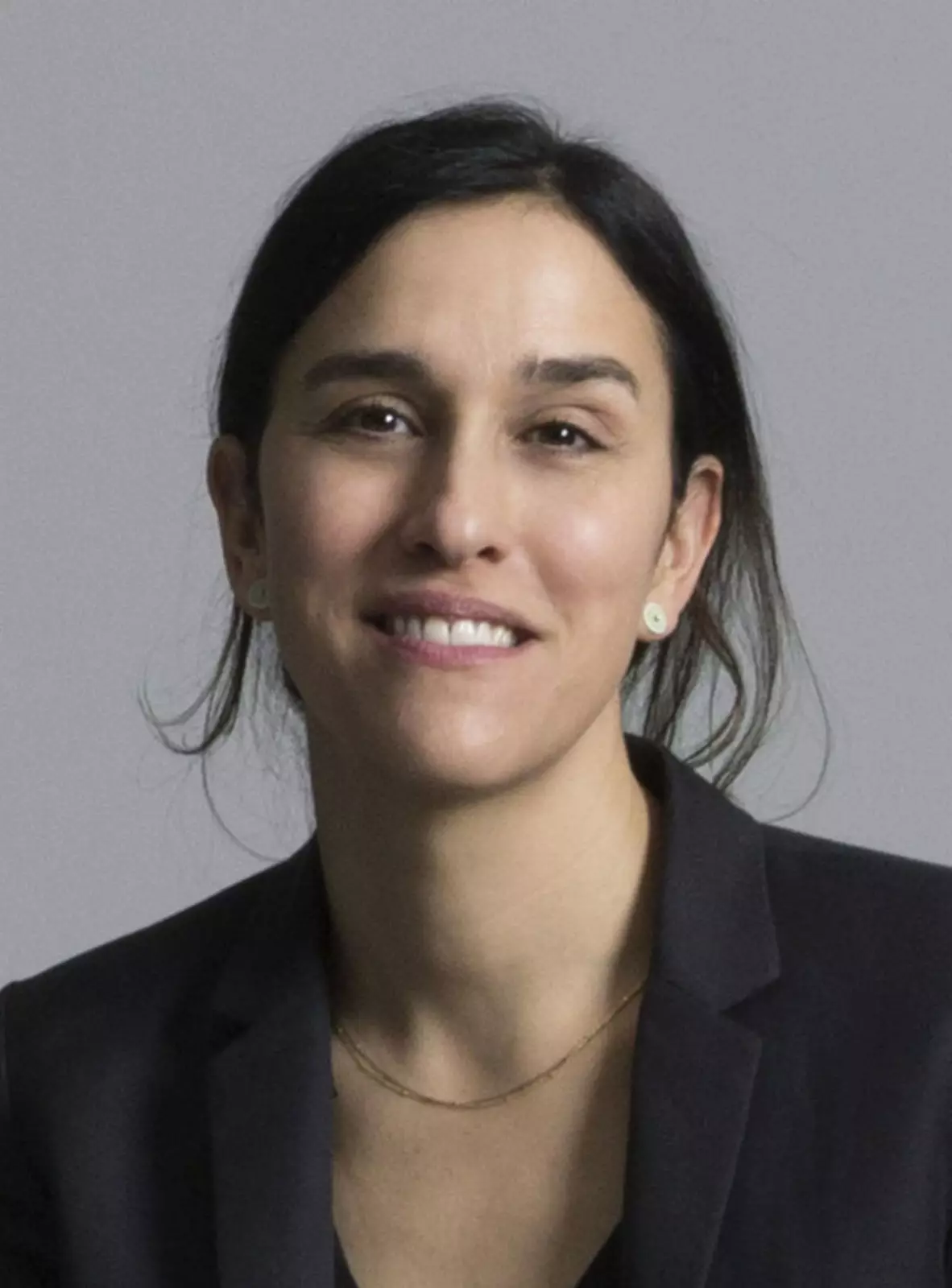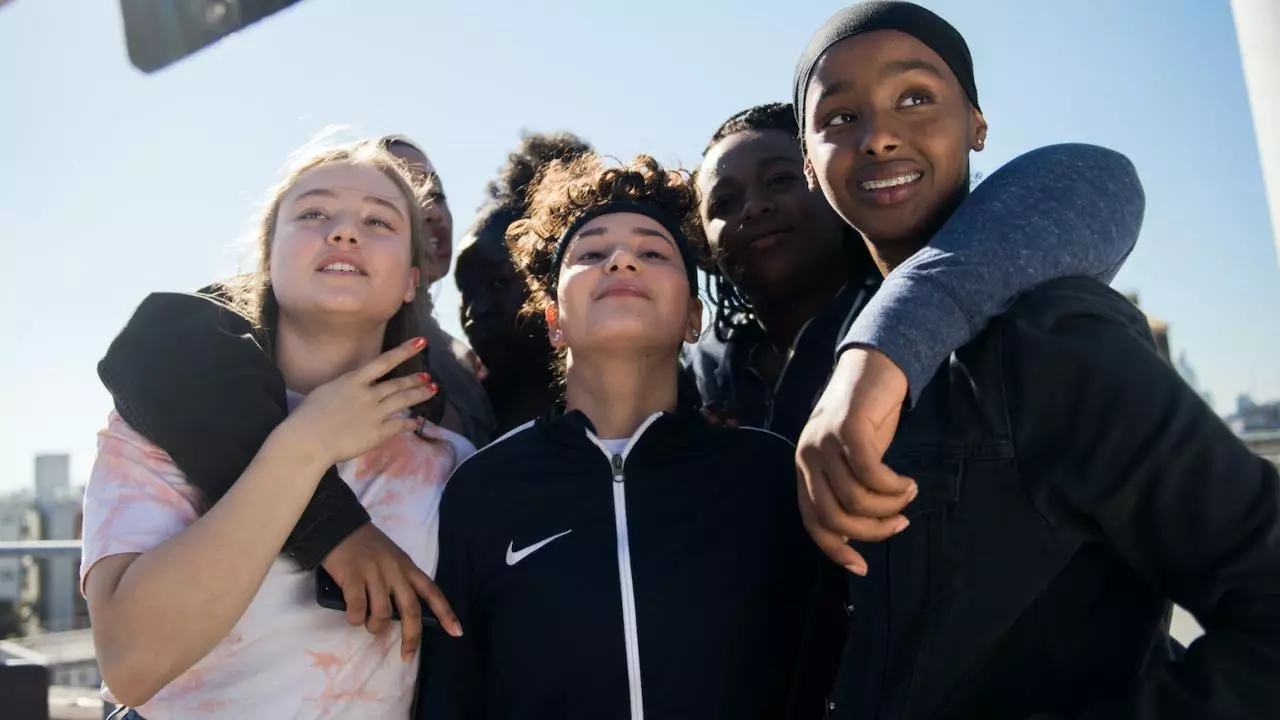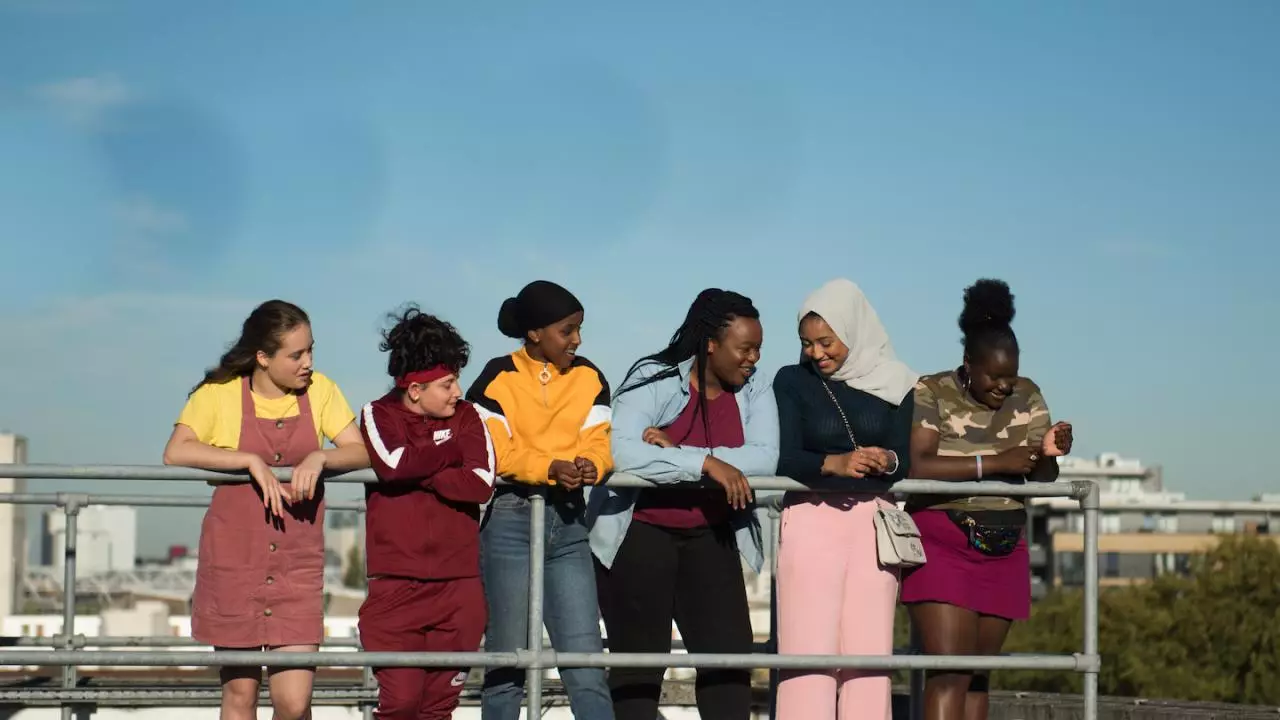
- To begin with, I would like to congratulate you with a nomination for the BAFTA Award.
- Thanks a lot. Yesterday we spent the whole day for communication with the press on this reason, and I still overwhelm emotions. BAFTA never nominated such a number of women and representatives of different ethnic groups in the directorial category. This is true progress. Although BAFTA always tried to notice absolutely different films, support new ideas and stimulate young filmmakers to shoot more and more.
- In general, it was difficult to promote your film in such a difficult time?
- Indeed, time is not easy. It seems to me that everyone collided with many problems, especially in the movie industry. It is hard to imagine how independent cinemas suffered greatly because of Lokdanun. Our plans also changed dramatically in connection with the pandemic. We were going to release Rocks in April last year, but a week before the release we were planted for quarantine. As a result, the picture we put on the shelf at an indefinite time. Then the Black Lives Matter happened, and all the participants in the film became activists of this movement. They just had no before. But we still managed to release Rocks to rent for a couple of weeks, when locked restrictions decreased slightly. Shows passed strictly in masks, the seating was in a chess order, and the side looked very surrelevant. However, people were able to see the movie - this is the most important thing.
- Your previous films for the most part were adaptation and spoke about the past and difficulties that women faced, living in East London. Rocks is a completely different movie that tells about the young generation of Londoners living now. Why did you move towards the real one?
- You see, being a teenage daughter's mother, I live her interests, so it was she who pushed me to create a plot on a modern topic. I was still influenced by the spectators with whom I met during the special show of the "soul fusion", it became more interesting for me how young girls live in London. In my time, there were no films in cinemas, where in the center of the plot was a female character. And then I really wanted to watch a film about the mature of the young girl in Britain, with which I could relate my life experience, but they simply were not. But now I have the opportunity to tell about the current generation. Only you do not think, it is not a typical story about a teenage girl, love and any such. First of all, Rox is a picture of a real female friendship, created by a team of young cinematographer.

- And how do you generally find your heroine? You first see the story and then find images or vice versa?
- You know, each film had a different process of creating history and find the main character. For example, the Studio Film Four itself turned to me and offered a book Monica Lee, which became the basis of the plot of the film "Brick Lane". It was the author that created such a volitional Nazin, its progressive children, a conservative husband and a passionate young lover. I just caught up with this story, and later Abby Morgan wrote a wonderful script. A different journey was waiting for me with the film "Sufrazheki". For a long time I did not give peace by the story of their struggle for your rights, and I really wanted to transfer her to the movie screen. At that time, we had a lot of available information, not only the biographies of real sofezhestok, but also unique archive shooting. Together with Abby Morgan, we conducted a serious investigation and created a separate story where each heroine carries different features of the characters of real historical characters. And already quite otherwise we approached my last film "Rocks". We were looking for interesting young girls, and we did not clearly indicate who generally we are looking for. In our film could be involved any, regardless of its social status and nationality. With each we met, we spoke and watched, with whom the real friendship is planned. We had special workshops for this, based on the results of which one of the scripts - Teresa Ikooco - came up with the plot, where the sister loses his younger brother. So for each film we had different approaches.
- You often mention in your films, in which locations are the heroine. In the Brick Lane, this Brick Lane, in the "soulwasters" mod rose in the Bethnal Green area, girls from Rocks discuss Dalston and, as I understand it, live in the Hoxton area. Why do these places and what do they differ from others in East London?
- It's funny that all actions in my films took place within a radius of two miles away. In fact, I live in the northern part of London, but also eastern London knows well. I was always interested in this location because of the immigrant arriving there. Communications of each area in East London changed with the emergence of different ethnic groups. Just this, I was interested in the BRICK Lane street, where the church was first, then the synagogue, and at the end built a mosque. The connection of different nationalities, cultures and ideas can be found on these streets, and it is for that I loved East London and trying to show it in every way in my films.
- You started your career in the early 2000s and were concerned about the shortage of women directors in the film industry. What do you think, how much did everything change during this time?
- Unfortunately, it took a lot of time and strength to finally achieve something in the film industry. When I only finished a movie school, there were very few women directories for hearing. But even at that time, we often mentioned the work of Jane Campion and Sally Potter. In the subsequent years, women in the film industry became less, then a little more, and then it became less again. Changes were unstable, and some oscillations have always happened. Only thanks to the movement of #Metoo, Timesup women managed to break into the film industry much further. Currently, more women are nominated for different prestigious premiums, they receive statuettes for their work and tell absolutely new stories. I think now the right time for a new generation of directors to go out and share your ideas. To sell your stories to producers, it was also much easier to sell, because now there are more open people, the earlier. But we also need people of different nationalities and other social status in the film industry.

- It turns out, a lot of work has to be changed to change the rules of the film industry.
"It is, it will still have to do so much."
"In one of the interviews, you said that on your directorial style was influenced by the works of Mike Lee, Stephen Fryirsz and Terens Davis. What kind of films can call your loved ones and explain why?
- Oh, this group of three men was at the very beginning of my director's path. When I was a teenager, I watched only Hollywood films, so when I met the films of Mike Lee, Ken Loucha, Stephen Fryirsz and Terens Davis, was very surprised. The fact is that their paintings were about modern Britain, and for me it was something else, something new and unknown. At that time, I did not even think that a woman could become a director, because everywhere there were some man's names. Only after watching the films Jane Campion, I realized that everything was possible. Already being in a movie school, I learned about such directors as Bergman and Tarkovsky, and later our training coincided with the advent of the Danish Dogma-95. It turns out that in different periods of my career, many directors affected me. For example, during the creation of "souffrip", I was inspired by the films "Battle for Algeria" Jillo Pontecorvo and "Blood Sunday" Paul Grringrassa. When I decided to work on Rocks, I watched Celine Xyamma and the painting "Divine" Uda Benjamins. So many directories tell wonderful stories about women's friendship, so I wanted to learn about it as much as possible. That's recently, I looked at the "land of nomads" Chloe Zhao and I can't throw this film out of my head. I really like how it connects the elements of the artistic cinema and documenting in one picture.
"It seems to me that the synthesis of documentary and artistic cinema can also be traced in your films. In principle, how do you prefer to work with the actors, do you have some kind of one's own unique method?
- Perhaps possible. Regarding my method of working with actors, you see, it is very important for me to know a person from different sides. Some artists love to discuss the scenes of the clock and come to some consensus, others simply first want to physically feel their character and then make decisions. I am ready to work with any of them. For example, as I mentioned, during the creation of Rocks, we had different workshops with actresses. They were all a little different, because it was their first film, so I had to deal with some educational activities. With the shooting group, we decided to abandon the classical methods of filmmaking, where you need to get up at a certain point, the light is defined right in the face, the scenes are removed in chaotic order and the director shouts: "Stop! Removed!" As a result, we all took off the chronology, no one said "stop", and we sometimes had even three cameras on the site. By the way, in the composition of the film crew there were many women, especially the operator, and they were all very similar to the heroine from the film.
- During the interview, you managed to mention the directors in the film industry. Maybe you call a couple of names of still unknown British cinematographers, for which it is already worth watching?
- Oh, in fact, this is such a serious question, you have to sit on it and think. Now I am performing someone like a mentor and helps with different questions of the director of Victoria Thomas. She is a Scotland of African descent and just removed a short meter. He has not come out yet, but soon you will hear about him. I was still struck by a wonderful job of Rose Glass "Savior", which was already shown at many film festivals. But I would like to return to the director women who have already shown themselves in the film industry, and add a couple more names. This is, of course, Carol Morley, Andrea Arnold, Lynn Ramsey and Susanna White. But I am completely sure that there will be even more names in the future, because now the right time for women to go out and tell their stories.
